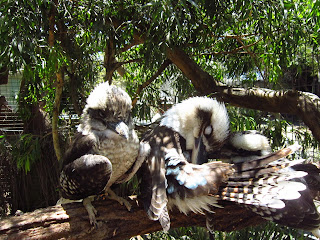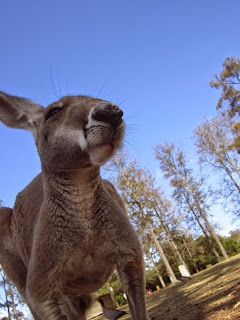I wanted to take time to compile some notes on the Marine Biology and Terrestrial Ecology (MBTE) EAP that I just returned home from. Hopefully, this will serve as a repository for some sundry notes that I think might be helpful to future students considering this experience. Anyone about to embark on this already has a ton of reading to do (pre-departure check-lists, program guides, participant page details, etc.) While I intended this to be less dense, it did not fully come out that way. My apologies for adding to the load of reading. I tried to include mostly details that are not covered in the program materials.
I am all too happy to chat and share my experience, if any clarity is needed (mpavesic@uci.edu)
First thought: Do it! It is amazing.
But here are some things that are worth thinking about and preparing for...
(*) The Program Office
This is an amazing resource ready and willing to help. Ross, Justine, and Jemma are three wonderful human beings. They have brilliant humour and a tender empathy. Ross helped a few of us navigate the confusing urinal trough etiquette of Australia. Jenna and Justine went out of their way to help me track down resources for interests and needs I had outside the program. They really were the spokes that kept the whole thing rolling.
(*) Library
Make sure you have figured out remote access to your UC campus library system. Unfortunately, the nature of this program (and the visa on which we travel) prevents us from being official UQ students. Therefore, our library access on the UQ campus is iffy. Since we needed to do literature searches and analyses for our Terrestrial Ecology writing assignments and our Marine Biology research projects, it is imperative that you can easily log into your home campus' database.
(*) Commuting
I had originally wanted to purchase a bicycle and use that as a means of getting to and from uni in Brisbane. However, I discovered that my homestay was on the side of a mountain. While I would have come out of it ready for the Tour de France, my first few weeks would have been miserable as I crushed myself into shape. I found it rather enjoyable, if at times frustrating and bewildering, to navigate the Brisbane public transit system. The program furnishes us with a Go Card that you tap on a sensor as you enter and exit busses, trains, and the ferries. Translink.com.au is a good resource for plotting trips (Google did a decent job as well) and re-loading the Go Card (allow a couple days before you are out of money, as it sometimes takes 48 hours to approve the payment and get the money onto the card). Transit is not cheap in Brisbane, but then nothing really is.
(*) Money-stuff
I am by no means a financial genius. Far from it, in fact. I am borderline fiscally illiterate. There is a lot to consider with this program, given how expensive it is. Additionally, Australia is very expensive. For some reason, no one in our crew got used to that fact over the course of the three months we were there. Up to the very end, people were still wincing over the prices charged for certain things. I do not drink. However, I would occasionally join everyone in a bar to hang out. The coca-cola I would order (that would come in a pint glass for $2.00 in the U.S.) would come in a smaller glass for $4. I am sure alcohol was even more inflated. Everything is more expensive.
However, all meals on this program are provided. If you manage it correctly, any money you spend out of pocket is just for enjoyment. I treated myself out for a couple meals, but mostly, I made sure to pack lunches and then return to my homestay for dinner. I barely spent money on anything besides transit, coffee, and souvenirs at the end.
Be prepared that transit is expensive. I believe there is a recommendation on what to budget for that in the program manual. However, one thing they do not tell you is that after 9 or 10 trips on public transit in a week, the remainder of the week is free. Therefore, after a week in Brisbane of going to the UQ campus (Uni, as it is abbreviated), the entire weekend was free. This made going out on a weekend a piece of cake. Some people made weekend trips out to the Gold Coast or Sunshine Coast. The transit there could be expensive, but they could count under the Translink deal. Good to plan ahead.
Additionally, it helps to avoid the ever-lurking fees for international banking. Some banks, like Schwabb and some credit unions do not charge internationally, I believe. Bank of America has a deal with WestPac bank in Australia (don't worry, it is just about everywhere) and does not charge international ATM fees. Therefore, I could get cash in AUS$ without much fuss. I was not a BofA customer but opened an account for this trip. At the end, I was able to close out the account once back in the States without incurring their minimum balance fee (which has a 3-month grace period).
Oh, and something cool...the bank notes in Australia are made of a propylene polymer. Essentially, they have plastic money! The money barely tears and survives a run-through the laundry. In addition to being durable, it is highly colourful and more environmentally friendly. Also, their $2 coin is tiny, which means that when you find a dropped coin on the street, there is a much higher chance that it is of actual value than a penny.
(*) Homestays
At a certain point in the spring, I was sent a questionnaire to fill out. This included my dietary preferences for the field trips and some details to help them assign homestays. Be very honest and up-front about your needs. I did not really want to live with children. I said so. In order to avoid confusion and issues with my varied dietary restrictions, I decided to eat vegetarian on this trip (and very glad I did).
You will get lots of input on this. Take it seriously. Communicate. Politely ask for what you need. A lot of families are similar to middle American families. They may not understand the degree to which Californian students eat their vegetables. Many of my classmates found themselves in need of more. When they asked more than hinted, they got more. Be prepared that everything is going to seem so much more alien, precisely because it so vaguely similar to home. This program does not offer a lot of interaction with Australians. Take the homestay as an opportunity to rectify this. Participate where warranted in their lives. Most were all too happy to have the homestay tag along to birthday parties, family outings, etc. My hostess (Heather) was incredibly excited to have someone who would engage in conversations about Americans and Australians. I had the opportunity to go on outings with her and her granddaughters. We had a marvelous time. I also got to be the weird foreigner to the kids. I offered to help with cooking and cleaning. A couple times, I prepared meals for Andrew (my roommate) and Heather. It was great. Andrew and I helped he with computer issues sometimes. All these tiny things, often started by our just stepping forward and offering a hand, brought us closer to Heather and enriched our experience.
(*) Coursework
A big thing we all constantly had to remind ourselves was that we were not on vacation. Everything was beautiful. We were just coming off summer vacation. The classes start a little gently. Then, it picked up big-time. There are three courses that make up this program: Marine Biology, Terrestrial Ecology, and Australian Studies. I do not understand the way everything was scheduled, but sometimes we would have two weeks of intensive lectures (four per day) followed by exams and papers. There is work to do beyond that we did on the field trips. We had readings to do for Australian Studies, as well as final paper. Terrestrial Ecology has a field manual that you work in during the field trips, but the manual also has some writing assignments and other tasks to accomplish while in the city. We had to write a research proposal and two research papers (tied to the field trips) for Marine Biology. Stay on top of it.
The academic climate in Australia is very casual. Professors go by their first names (in the blog, I use Dr. John to help differentiate him from my classmate Jonathan and Tibbetts because he does go by his last name and to differentiate him from my classmate Ian). Remember, though, that the faculty are still worthy of respect, and first names do not mean the work doesn't still need to get done.
Assessments (exams) are conducted in an interesting way. We generally were given 5-10 minutes at the beginning of the exam to read it over. Sometimes we were allowed a highlighter, but you could not otherwise mark the exam or truly begin working on it. This time was to review the exam, ask questions about parts that you do not understand, and plan how you would approach it.
Unlike UC, the grades are not on a curve. Therefore, while we come to this accustomed to competition and adjustment, that does not apply to the grades you get in this program. Also, most universities in the world grade on a harsher scale. While I felt crushed about scoring an 80% on a certain assignment, they told me that was exceptionally good. The sort of go-getter students who end up participating in MBTE are used to high scores. Remember that assessments are scored a bit more strictly (with lower percentages awarded) and it is not uncommon for grades to slip slightly while abroad anyways.
(*) Sun
The Australian sun is intense. The hole in the ozone is actually filling in, something we do not hear much about, even though it is a truly encouraging outcome following a multinational response to the CFC-induced environmental crisis. However, for whatever reason, it is really easy to burn. My first sunburn (and it stung!) came on the last day of our Girraween field trip, when it was overcast and raining. Apply sunscreen liberally and regularly. Wear a brimmed sun-hat. It helps. I also bought polarized sunglasses for the trip, as my eyes are really sensitive.
And hydrate! If you ever have experienced dehydration, you know that the headache and nausea are no joke. It can also be truly medically serious, and on field trips you are not a short ride from a hospital. Drink more water than you think you need. It is okay to have to stop and urinate in the bush. Oh, and remind Dr. John to hydrate...he sometimes forgets and gets a bit loopy.
(*) Australian "English"
Be prepared to ask people to repeat themselves, and to occasionally be lost. While they speak "English" some people have a difficult time with the accent. It is okay. They also have a difficult time understanding us. They have a tendency to abbreviate things, to excess. University is Uni. McDonald's is Macca. Mosquitos are Mossies.
There are also some common phrases worth being aware of (because you will find yourself using them unconsciously, regardless of any intention not to)...
G'day : Hello
How you goin'? : How are you doing? How is it going?
No worries : general statement of wellbeing. They also use this in place of "You're welcome."
Cheers : Thanks
Ta! : Thanks (normally used by women)
And for those who were wondering...
 |
| The water goes down the drain in THAT direction. |


















%2BGirraween%2BLine%2BUp.JPG)
%2BA%2Bbit%2Bdamp%2Bat%2BGirraween.JPG)
%2BMount%2BWarning%2BView.JPG)
%2BLamington%2BGroup1.JPG)
%2BLamington%2BGroup2.JPG)
%2BLamington%2BGroup3.JPG)
%2BBurleigh%2BBeach1.JPG)
%2BBurleigh%2BBeach2.JPG)
%2BUC%2Bat%2BCarnarvon%2BSwimming%2BHole.JPG)
%2BWarrumbah%2BCanyon%2B1%2Bof%2B2.JPG)
%2BWarrumbah%2BCanyon%2B2%2Bof%2B2.JPG)
%2BUC%2Bat%2BCarnarvon.JPG)





















































